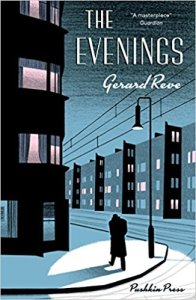 ‘The Evenings’ by Gerard Reve has been hailed as a “postwar masterpiece” and “the best Dutch novel of all time” but has only recently been translated by Sam Garrett and published in the UK for the first time by Pushkin Press late last year, nearly seven decades after it was first printed in the Netherlands. It tells the story of Frits van Egters, a 23-year-old clerk living with his parents in Amsterdam who struggles to fill his non-working hours with anything meaningful, spending his evenings walking past the canals, seeking out conversation with his small group of friends including his brother Joop.
‘The Evenings’ by Gerard Reve has been hailed as a “postwar masterpiece” and “the best Dutch novel of all time” but has only recently been translated by Sam Garrett and published in the UK for the first time by Pushkin Press late last year, nearly seven decades after it was first printed in the Netherlands. It tells the story of Frits van Egters, a 23-year-old clerk living with his parents in Amsterdam who struggles to fill his non-working hours with anything meaningful, spending his evenings walking past the canals, seeking out conversation with his small group of friends including his brother Joop.
Essentially a novel about boredom, ‘The Evenings’ was widely considered to be “untranslatable” and “too Dutch” to appeal to an audience outside the Netherlands (this article in The Atlantic provides some very interesting context). I haven’t read much Dutch literature in translation to compare but it is true that the style of the prose in ‘The Evenings’ is quite dense and I can also see how the dark humour might have been tricky to translate. While there are comic and absurdist aspects to the novel, particularly in Frits’s interactions with his parents, the bleakness and mundanity of his life is also pretty unrelenting.
In his aimlessness, Frits can be a difficult character to pin down and is sometimes contradictory. There are times when he hides behind sarcasm while on other occasions he is obsessive or paranoid and is often very direct towards those around him. There is relatively little in the way of plot over the ten consecutive days depicted in each of the ten chapters, most of which are set in the limbo period between Christmas 1946 and the new year. Anyone who has ever started the day determined to be productive only to find the hours slipping by with nothing accomplished will identify on some level with his situation.
One of the most striking aspects of the book is that there are few specific mentions of the Nazi occupation in the Netherlands or even the Second World War in general which had only recently ended, yet the impact of these events can still be felt in Frits’s restlessness, and especially in his disturbing dreams. Consequently, the overall effect of Frits’s repetitive cycle of boredom is a lot more compelling than the detail, with the theme of tedium becoming tedious itself in some places. However, I think ‘The Evenings’ is worth reading alongside some background about the context in which it was written (such as the article linked above) and will appeal to those who are interested in existentialist literature – as well as those who have a more sophisticated understanding of Dutch humour than I do.
Many thanks to Pushkin Press for sending me a review copy.





This one wasn’t on my radar, but it sounds riveting! I’ll definitely keep my eye out for it.
LikeLike
Hope you enjoy it!
LikeLike
I read this last year and, like you, ultimately found it pretty repetitive. I enjoyed the atmosphere and the final epiphany of sorts, though.
LikeLike
Yes, it’s more interesting when seen as part of a bigger picture, I think.
LikeLike
Seems like it is good on atmosphere. The cover is really lovely.
LikeLike
Yes, it’s a beautiful cover – definitely one to read for atmosphere rather than plot though!
LikeLike
I liked this – I thought Fritz was a very recognisable character type, his nixed feelings for his parents in particular. You’re right, though, it’s a strange mixture of comedy and boredom.
LikeLike
Yes, he definitely has recognisable traits and it was interesting to see how Reve explored this alongside a theme which is not all that common in fiction.
LikeLike